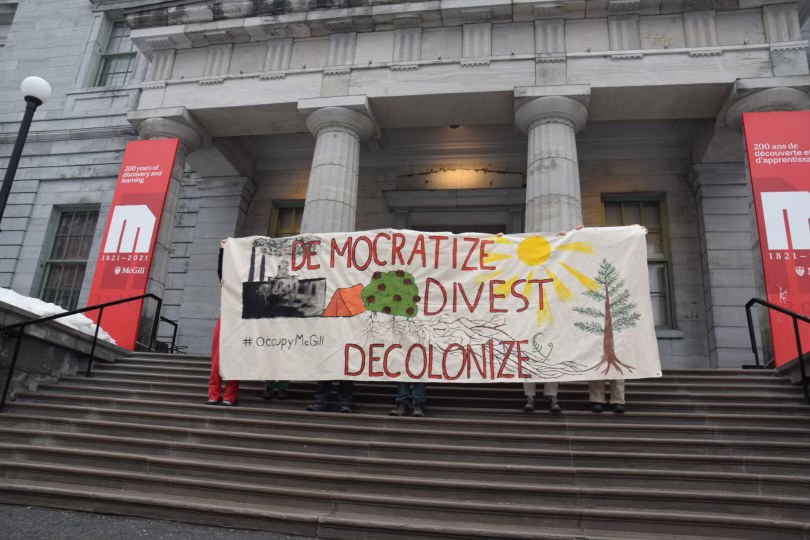As students returned to McGill from Reading Week, they may have noticed that downtown campus looks a little bit different. There is more slush than snow on the ground. More students and faculty flow in and out of buildings. And, outside of the Arts Building, a giant yellow banner waves out reading, “Occupation En Cours.”
This display is part of Divest McGill’s movement to Occupy McGill: a confrontational demonstration intended to decolonize, democratize, and demand climate action from McGill’s administration. Divest McGill’s occupation aims to use tactics of visibility and disruption to expose the growing rift between student and faculty interests on campus, versus those of the McGill administration.
“As you may or may not know, we are approaching the ten year anniversary of Divest McGill, shared Olivia, U3 Arts and Divest McGill organizer.* “It is clear now more than ever that we need intense escalation and confrontation, in addition to community-building and mobilization.”
Divest McGill was founded in 2012 in an effort as “Decorporatize McGill,” but it changed its name to embody an environmental mission. Amidst increasingly frightening predictions from top environmental scientists, the direct action group calls for McGill to totally and openly divest from the top 200 fossil fuel companies around the world. Over the past decade, Divest McGill has grown to encompass over 150 students, and it has employed tactics such as petitions, dance parties, and viral videos.
Occupy McGill aims to embody similar principles of democratization and grassroots dialogue.
This protest in particular arrives at the ten year anniversary of the 2012 Quebec student strikes, in which students in universities across Quebec protested a tuition hike under the Charest government. With tents stretched across the main hall of the Arts building and food in reusable tupperwares being handed out from student to student, Occupy McGill aims to embody similar principles of democratization and grassroots dialogue.
“We see this space as an opportunity to engage with the student body in dialogue with the common problems our community members are facing,” said Leo, U2 Science. “[Occupy McGIll] is a way to mobilize the student body and build relationships in order to imagine a new way to organize the university in the future.”
It’s telling the community around us that this is our space as much as it is anybody else’s.
As students and professors passed by the protest on their way to class, Olivia mentioned why the Arts building was the perfect spot for Divest McGill’s demonstration. “We are in the Arts building, which is one of the most symbolically important buildings in the McGill community and the broader Montreal community. It’s telling the community around us that this is our space as much as it is anybody else’s.”
In October 2021, the University of Toronto announced its plans to divest from all direct investments in fossil fuels in the upcoming twelve-month period. Elsewhere in Canada, the University of Waterloo announced its plans to divest last June, which followed the example of Harvard University in the United States.
McGill, however, has yet to match the University of Toronto’s extensive commitments. In a recent interview with the Bull & Bear, outgoing Principal Suzanne Fortier mentioned Divest McGill assured that McGill is indeed taking substantial steps to abate the climate crisis. She cited examples such as the university adopting a comprehensive and expensive decarbonization strategy, as well as introducing a new course about climate literacy and sustainability that will be accessible for all students.
Yet, for many student activists, these commitments are incomplete without total and transparent divestment from fossil fuels. Within the Arts building on Tuesday, amidst walls of sticky notes and hand-drawn posters, there existed a shared sense of disillusionment about what the administration says and promises, versus what students and faculty at McGill actually experience.
There were certain demands with students and faculty that were just not met.
“One disconnect for me was how the administration just doesn’t seem to care,” said Leo, explaining how his experiences attending McGill did not match his expectations as a prospective student. “We saw this with COVID. There were certain demands with students and faculty that were just not met.”
Notably, Divest McGill views climate justice as intrinsically tied to other social justice causes. In addition to calls for divestment, the group also expresses solidarity with Indigenous peoples and other marginalized identities. For instance, Divest McGill was particularly active during the Wet’suwet’en anti-pipeline demonstrations last year, and the Occupy McGill official manifesto explicitly states how the organization aligns themselves with anti-capitalist and anti-colonial politics.
While the Occupy McGill campaign is indeed protesting the actions of the inert administration and disrupting the flow of foot traffic on campus, Olivia and Leo wanted to remind the Bull & Bear that they were not protesting in spite of the university or to burden students and faculty on campus. Rather, they have gathered in the Arts building because they care about the well-being of students and faculty at McGill, and they would like to see campus interests represented over the interests of CEOs and shareholders.
“This is motivated out of love for the McGill community and the people that make this place what it is,” said Olivia. “This is for the students, staff, and faculty at McGill.”
Names in this article have been changed to respect the wishes of the organizers and protestors to remain anonymous.
EDIT 09/14/22: Title has been changed.








